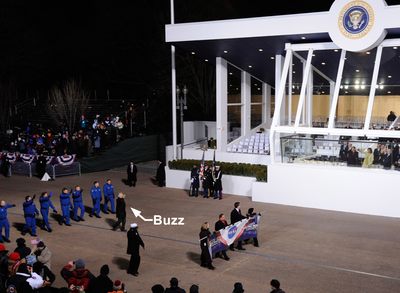Moonbuzzby Dwayne A. Day
|
| Aldrin helped me realize very early on that moonwalkers did not walk on water, and to develop a greater respect for Neil Armstrong, whose shunning of the limelight made him seem incredibly dignified. |
Over the next decade I ran into Aldrin a number of times at various professional events, and we occasionally talked briefly, but I’m sure that he never remembered who I was. He even generously signed a couple of photographs for me, one of which I gave to my parents for Christmas. But it did not take me very long to realize that Aldrin was a little goofy, to put it mildly. He was clearly a very smart guy. But he lacked focus, as anyone who saw his various space engineering ideas come and go over the years can attest. He also stuck his name on just about every commercial product he could (which led one colleague who knew him to come up with a hilarious joke about a new Buzz Aldrin product too ribald to repeat here). Aldrin’s desire for recognition and attention, and his habit of jumping in front of every television camera or onto every stage (best symbolized when he lobbied to lead the NASA section of Obama’s inaugural parade, or appeared in a music video, or on Dancing With the Stars), seemed to diminish his effectiveness, as well as his reputation. Thankfully, Aldrin helped me realize very early on that moonwalkers did not walk on water, and to develop a greater respect for Neil Armstrong, whose shunning of the limelight made him seem incredibly dignified.
Aldrin did become one of my heroes again when he punched an annoying twit in the face in 2002. He might be a bit goofy, and his space policy ideas not terribly consistent, but he still had an effective right cross. Even in his seventies, he makes a good action figure.
Buzz Aldrin is back in the news again for his views on the Obama space policy. According to a FoxNews.com story, Aldrin has criticized the Mars focus of the new plans, and he supposedly now favors a lunar base, which was the focus of the previous Bush policy. But all of this should be prefaced with multiple uses of the word “supposedly,” because there are several reasons to at the very least question the story’s reporting.
The first reason, of course, is that this is FoxNews.com. To state the obvious, Fox is always looking for rocks to hurl at the Obama Administration, and “American hero criticizes Democrat(ic) president” is the kind of story idea that a Fox reporter can take to his editor confident that it will run, even if it isn’t exactly, well, accurate.
| Although the article is about 1,000 words long, and briefly quotes Aldrin about half a dozen times, Aldrin is never directly quoted recommending abandoning Mars plans in favor of a lunar base. |
But the better reason has to do with a close reading of the article itself. You have to carefully read a news article. That was a point that I tried to make several years ago when Aviation Week ran a cover story on the existence of a top secret spaceplane program that the magazine called “Blackstar.” (See “Six blind men in a zoo: Aviation Week’s mythical Blackstar”, The Space Review, March 13, 2006.) If you went through that article carefully and underlined any statement in quotation marks, and underlined every named source of information, you quickly concluded that the reporter was not quoting or naming many people, and that much of the article was in fact speculation and hearsay (i.e. someone told someone who told someone who maybe mentioned it to the reporter), not actual facts. The Blackstar story could be true (I don’t believe it is), but a very careful reading indicated that the reporter did a poor job of gathering facts, testing their veracity, and fully supporting his claims.
Now here’s an exercise that you can do with the FoxNews.com article: print out a copy and read it all the way through and highlight the direct quotes from Buzz Aldrin in the article. (Or just use your browser’s search function to find any use of quotation marks and see what is between them.)
Although the article is about 1,000 words long, and briefly quotes Aldrin about half a dozen times, Aldrin is never directly quoted recommending abandoning Mars plans in favor of a lunar base. Aldrin’s alleged shift in space goals can only be found when the reporter paraphrases what Aldrin supposedly said, not when he quotes Aldrin directly, and paraphrasing makes it possible to lose a lot of nuance and detail.
Now maybe Aldrin did indeed say these things, and maybe he does have a position about Moon bases that is somehow different than the opinions he expressed in the past. But it seems equally if not more plausible that the reporter misunderstood or misreported the issue. And since he did not directly quote Aldrin on these things, we just don’t know what Aldrin actually said. I don’t know anything about the reporter, but I doubt that he’s extremely knowledgeable about American space policy and understands all of its intricacies and nuances.
Bottom line, Buzz Aldrin may have a long history of being erratic, but he still gets the benefit of the doubt. And until he puts out his own press release, or gives a speech that we can watch, we won’t know exactly what his position is. But don’t worry: if the reporter got the story significantly wrong, Buzz still has that right cross.
